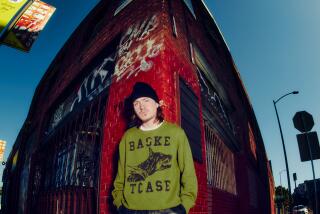POP WEEKEND : Richman, Burnett: A Pairing Off That Pays Off
- Share via
The pairing of the ofttimes whimsical Jonathan Richman with T-Bone Burnett, writer of some of rock’s most convoluted and weightedly ambiguous tomes, might not have seemed such a natural thing prior to their show Saturday at the Coach House. In retrospect, though, it seemed little less than inspired as, despite very different approaches, each performer is essentially a moralist.
While Burnett’s cerebral approach to delineating moral dilemmas has garnered him gobs of critic-bestowed “importance,” Richman is a far more effective communicator on stage. For more than a decade he has been tirelessly offering his vision of what rock ‘n’ roll should be--direct, human and as stripped of the hyped-up volume and trappings of arena as possible--and the effort has paid off. Performed with an alarming earnestness, even his lyrics about chewing-gum wrappers or Greyhound bus trips become a challenge to touch the intensity in each moment of life.
Saturday, his short set offered odes to heroes as divergent as Vincent Van Gogh, whose “paintings had those colors because he loved life so bad,” and baseball great Walter Johnson, who, Richman’s song explained, “cared about people more than he cared about fame.”
On stage, Richman very much exemplifies the inspiration he sings about, making up verses on the spot and even, after an offhand request from an audience member, reprising one of his new songs, “Closer,” with an on-the-spot Spanish translation. He accented his lyrics with a body language rich in the romance tongues and at times in mid-song would eschew his guitar and the microphone altogether to sing more directly to the audience.
One of his still-unreleased songs was full of playful imagery about one of Orange County’s grand contributions to American culture--the Fender Stratocaster guitar: “Like the wind in your hair when the top is down, like taillights headed for another town: Fender Stratocaster.” More often, though, his lyrics were haunting in their immersion in the world most of us lose with youth, as on the encore “That Summer Feeling”: “When there’s things to do, not because you’ve gotta / When you run for love, not because you oughtta / When you trust your friends with no reason not ta / That joy I’ve named shall not be tamed, and that summer feeling is going to haunt you one day in your life.”
Burnett, despite fighting an obvious case of nerves that may have been due to a 5-year performing layoff, delivered a set whose strengths were obscured only by its length. Basically, Burnett is a performer as monochromatic as the ice-cream suit he sported, lacking the variety to give his set’s 25 songs their full due.
Paring it down to his strong points, though, it was a triumphal return. He relied little on the sometimes leaden allegories of his recent “The Talking Animals” album, delving more into 1983’s “Proof Though the Night” and 1982’s “The Trap Door.”
From the latter, he performed the biting “After All These Years,” written following a coroner’s disinterment of Marilyn Monroe’s body. The song is a bitter attack at the way the essence of a person, not to say the person’s dignity, is ignored in the hero-making process. Saturday, Burnett rededicated the song to Elvis Presley, while also wryly noting that if the proliferation of Elvis impersonators continues at the rate it has since his death, by 2010, one out of three people in the world will be one.
Some of Burnett’s strongest songs were also among his least ambiguous, particularly those from his sadly overlooked 1986 country album, “T-Bone Burnett.” Of those “River of Love” and “Shake Yourself Loose” offered bittersweet ruminations on life and relationships that sailed in their spare simplicity.
Such songs could only have been stronger if Burnett had left out some of his lesser songs. Except for when he brought on Sam Phillips, his wife, for two songs during his nine-song encore, there was a cumulative sameness to the show that blunted its edge.
More to Read
The biggest entertainment stories
Get our big stories about Hollywood, film, television, music, arts, culture and more right in your inbox as soon as they publish.
You may occasionally receive promotional content from the Los Angeles Times.










